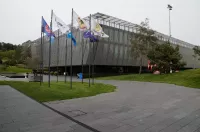Canada is a North American country, the second largest in the world by area, stretching from the Atlantic to the Pacific and into the Arctic Ocean. It shares the world's longest land border with the United States. Canada features diverse geological and meteorological regions. The population is over 41 million, with most people living in urban areas. Ottawa is the capital city, and the largest metropolitan areas are Toronto, Montreal, and Vancouver.
1921: Previous record of immigrants in 1921
The 2021 census had more immigrants than the 1921 census record.
1931: Statute of Westminster, 1931
In 1931, the Statute of Westminster granted Canada full autonomy.
1945: Canada founding member of UN
In 1945, Canada was a founding member of the United Nations (UN).
1948: Canada ratifies UDHR
In 1948, Canada ratified the Universal Declaration of Human Rights (UDHR).
1958: Formation of NORAD
In 1958, Canada, together with the United States, formed the North American Aerospace Defense Command.
1961: Visible minority groups in 1961
In 1961, about 300,000 people, less than two percent of Canada's population, were members of visible minority groups.
1962: Launch of Alouette 1
In 1962, Canada launched its first satellite, Alouette 1.
1974: Quebec's Official Language Act of 1974
Quebec's Official Language Act established French as the only official language of the province in 1974.
1976: 1976 Summer Olympics
Canada hosted the 1976 Summer Olympics.
1980: Adoption of O Canada
In 1980, "O Canada", originally composed in French in 1880, was adopted as the country's official anthem.
1982: Constitution Act, 1982
In 1982, Canada passed the Constitution Act, ending all legislative ties to Britain, adding a constitutional amending formula and the Canadian Charter of Rights and Freedoms, which guarantees basic rights and freedoms, although a notwithstanding clause allows override for certain sections.
1982: Section 35 of the Constitution Act, 1982
In 1982, Section 35 of the Constitution Act reaffirmed Aboriginal law and its support for Indigenous rights, including provision of services and exemption from taxation.
1984: Canada Health Act
In 1984, the Canada Health Act was enacted, which guides the provincial and territorial systems of publicly funded healthcare, known as Medicare, to ensure universal access.
1988: 1988 Winter Olympics
Canada hosted the 1988 Winter Olympics.
1988: Canada - United States Free Trade Agreement (FTA)
In 1988, the Canada – United States Free Trade Agreement (FTA) eliminated tariffs between the two countries.
1989: Canada founding member of APEC
In 1989, Canada was a founding member of the Asia-Pacific Economic Cooperation forum (APEC).
1990: Canada joins OAS
In 1990, Canada joined the Organization of American States (OAS).
1994: North American Free Trade Agreement (NAFTA)
In 1994, the North American Free Trade Agreement (NAFTA) expanded the free-trade zone to include Mexico.
2003: Canada reluctant to participate in Iraq invasion
Since the 21st century, in 2003, Canada has been reluctant to participate in military operations not sanctioned by the United Nations, such as the invasion of Iraq.
2010: 2010 Winter Olympics
Canada hosted the 2010 Winter Olympics.
2011: Increase in visible minority population between 2011 and 2016
Between 2011 and 2016, the visible minority population rose by 18.4 percent.
2015: 2015 FIFA Women's World Cup
Canada hosted the 2015 FIFA Women's World Cup and the 2015 Pan and Parapan American Games.
2016: Increase in visible minority population between 2011 and 2016
Between 2011 and 2016, the visible minority population rose by 18.4 percent.
2016: Indigenous population growth from 2016 to 2021
From 2016 to 2021, the Indigenous population grew by 9.4 percent compared to the non-Indigenous population, which grew by 5.3 percent.
2016: Population compared to 2021 census
In 2016, Canada's population was measured before the 2021 census which showed a 5.2% increase.
2016: Health Report
In 2016, a report indicated that 88 percent of Canadians reported good or very good health.
2017: Richard Wagner appointed Chief Justice
In 2017, Richard Wagner became the Chief Justice of Canada, leading the Supreme Court.
2018: Canada's trade deficit in 2018
In 2018, Canada had a trade deficit in goods of $22 billion and a trade deficit in services of $25 billion.
2020: Canada's Research and Development Spending in 2020
In 2020, Canada spent approximately $41.9 billion on domestic research and development.
2021: Religion in Canada in 2021
According to the 2021 census, Christianity is the largest religion in Canada, with Roman Catholics representing 29.9 percent of the population. Christians overall representing 53.3 percent of the population, are followed by people reporting irreligion or having no religion at 34.6 percent.
2021: Non-official first languages in 2021
As of the 2021 census, just over 7.8 million Canadians listed a non-official language as their first language.
2021: Canadian Trade in Goods and Services in 2021
In 2021, Canadian trade in goods and services reached $2.016 trillion.
2021: 2021 Canadian Census
In 2021, the Canadian census enumerated a total population of 36,991,981, which was an increase of around 5.2 percent over the 2016 figure.
2021: Commonwealth Fund's Report
In 2021, the Commonwealth Fund's report ranked Canada second-to-last when comparing the healthcare systems of the 11 most developed countries.
2021: Average Age in Canada
In 2021, the average age in Canada was 41.9 years, with a life expectancy of 81.1 years.
2021: Ethnic or cultural origins in 2021
In 2021, the ten largest self-reported ethnic or cultural origins were Canadian, English, Irish, Scottish, French, German, Chinese, Italian, Indian, and Ukrainian.
2021: Population of White, Indigenous, and Visible Minorities in 2021
Of the 36.3 million people enumerated in 2021, approximately 25.4 million reported being "White", representing 69.8 percent of the population. One out of every four Canadians or 26.5 percent of the population belonged to a non-White and non-Indigenous visible minority.
2021: Immigrant or permanent residents in 2021
The 2021 census indicated that 8.3 million people, or almost one-quarter (23.0 percent) of the population, reported themselves as being or having been a landed immigrant or permanent resident in Canada.
2022: OECD Report
According to a 2022 OECD report, Canada ranks first worldwide in the percentage of adults having tertiary education, with over 56 percent having attained at least an undergraduate degree.
2022: Refugee resettlement in 2022
Canada resettled more than 47,600 refugees in 2022.
2022: Canadian military expenditure in 2022
In 2022, Canada's military expenditure totalled approximately $26.9 billion, about 1.2 percent of the country's GDP.
2022: Per-Capita Spending
In 2022, Canada's per-capita spending on health expenditures ranked 12th among health-care systems in the OECD.
2022: Supplementary Estimates for Research and Development Spending in 2022
In 2022, supplementary estimates showed that Canada spent $43.2 billion on domestic research and development.
2023: Canada's Nobel laureates in 2023
As of 2023, Canada has produced 15 Nobel laureates in physics, chemistry, and medicine.
2023: Canada Free Trade Agreements in 2023
As of 2023, Canada is a signatory to 15 free trade agreements with 51 different countries.
2023: Canada's Corruption Perception Index in 2023
In 2023, Canada ranked low in the Corruption Perceptions Index, at 14th place.
2023: Most Popular Sport
In 2023, swimming was reported as the most commonly practiced sport by over one-third (35 percent) of Canadians, followed by cycling (33 percent) and running (27 percent).
2023: Population surpassed 40,000,000 in 2023
It is estimated that Canada's population surpassed 40,000,000 in 2023.
2024: Immigrants admitted in 2024
A record 483,390 immigrants were admitted to Canada in 2024.
2024: Canada's Global Competitiveness Report in 2024
In 2024, Canada ranked high in the Global Competitiveness Report at 19th place.
2024: Healthcare Spending
In 2024, the Canadian Institute for Health Information estimated that healthcare spending reached $372 billion, which is 12.4 percent of Canada's GDP.
Mentioned in this timeline
India officially the Republic of India is a South Asian...
Germany officially the Federal Republic of Germany is a nation...
Iraq officially the Republic of Iraq is a West Asian...

FIFA the F d ration Internationale de Football Association is...
Mexico officially the United Mexican States is a North American...

War is defined as an armed conflict involving the armed...
Trending
31 minutes ago Julian Champagnie shines as a 'Hidden Gem' for the San Antonio Spurs.

31 minutes ago Malik Monk shines in return, leading Kings' bench after injury recovery.

31 minutes ago Kypson faces de Minaur: ATP Acapulco clash predictions and alternative odds.

31 minutes ago TWICE to perform on Jimmy Fallon's Tonight Show: How to watch online.

32 minutes ago Kevin Nash Apologizes to Je'Von Evans After Offensive Remark; Raquel Rodriguez Comments

32 minutes ago Lee Ann Womack Returns With New Song; Hannah Harper Covers Her on Idol.
Popular

Jesse Jackson is an American civil rights activist politician and...

Barack Obama the th U S President - was the...

Michael Joseph Jackson the King of Pop was a highly...

Bernie Sanders is a prominent American politician currently serving as...

Susan Rice is an American diplomat and public official prominent...
The Winter Olympic Games a major international multi-sport event held...